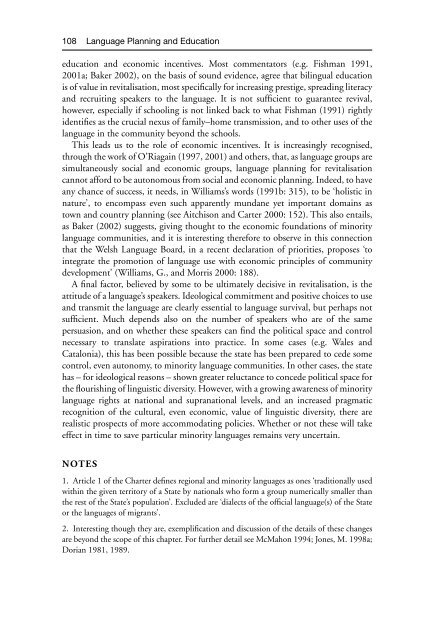Gibson Ferguson Language Planning and Education Edinburgh ...
Gibson Ferguson Language Planning and Education Edinburgh ...
Gibson Ferguson Language Planning and Education Edinburgh ...
Create successful ePaper yourself
Turn your PDF publications into a flip-book with our unique Google optimized e-Paper software.
108 <strong>Language</strong> <strong>Planning</strong> <strong>and</strong> <strong>Education</strong><br />
education <strong>and</strong> economic incentives. Most commentators (e.g. Fishman 1991,<br />
2001a; Baker 2002), on the basis of sound evidence, agree that bilingual education<br />
is of value in revitalisation, most specifically for increasing prestige, spreading literacy<br />
<strong>and</strong> recruiting speakers to the language. It is not sufficient to guarantee revival,<br />
however, especially if schooling is not linked back to what Fishman (1991) rightly<br />
identifies as the crucial nexus of family–home transmission, <strong>and</strong> to other uses of the<br />
language in the community beyond the schools.<br />
This leads us to the role of economic incentives. It is increasingly recognised,<br />
through the work of O’Riagain (1997, 2001) <strong>and</strong> others, that, as language groups are<br />
simultaneously social <strong>and</strong> economic groups, language planning for revitalisation<br />
cannot afford to be autonomous from social <strong>and</strong> economic planning. Indeed, to have<br />
any chance of success, it needs, in Williams’s words (1991b: 315), to be ‘holistic in<br />
nature’, to encompass even such apparently mundane yet important domains as<br />
town <strong>and</strong> country planning (see Aitchison <strong>and</strong> Carter 2000: 152). This also entails,<br />
as Baker (2002) suggests, giving thought to the economic foundations of minority<br />
language communities, <strong>and</strong> it is interesting therefore to observe in this connection<br />
that the Welsh <strong>Language</strong> Board, in a recent declaration of priorities, proposes ‘to<br />
integrate the promotion of language use with economic principles of community<br />
development’ (Williams, G., <strong>and</strong> Morris 2000: 188).<br />
A final factor, believed by some to be ultimately decisive in revitalisation, is the<br />
attitude of a language’s speakers. Ideological commitment <strong>and</strong> positive choices to use<br />
<strong>and</strong> transmit the language are clearly essential to language survival, but perhaps not<br />
sufficient. Much depends also on the number of speakers who are of the same<br />
persuasion, <strong>and</strong> on whether these speakers can find the political space <strong>and</strong> control<br />
necessary to translate aspirations into practice. In some cases (e.g. Wales <strong>and</strong><br />
Catalonia), this has been possible because the state has been prepared to cede some<br />
control, even autonomy, to minority language communities. In other cases, the state<br />
has – for ideological reasons – shown greater reluctance to concede political space for<br />
the flourishing of linguistic diversity. However, with a growing awareness of minority<br />
language rights at national <strong>and</strong> supranational levels, <strong>and</strong> an increased pragmatic<br />
recognition of the cultural, even economic, value of linguistic diversity, there are<br />
realistic prospects of more accommodating policies. Whether or not these will take<br />
effect in time to save particular minority languages remains very uncertain.<br />
NOTES<br />
1. Article 1 of the Charter defines regional <strong>and</strong> minority languages as ones ‘traditionally used<br />
within the given territory of a State by nationals who form a group numerically smaller than<br />
the rest of the State’s population’. Excluded are ‘dialects of the official language(s) of the State<br />
or the languages of migrants’.<br />
2. Interesting though they are, exemplification <strong>and</strong> discussion of the details of these changes<br />
are beyond the scope of this chapter. For further detail see McMahon 1994; Jones, M. 1998a;<br />
Dorian 1981, 1989.






